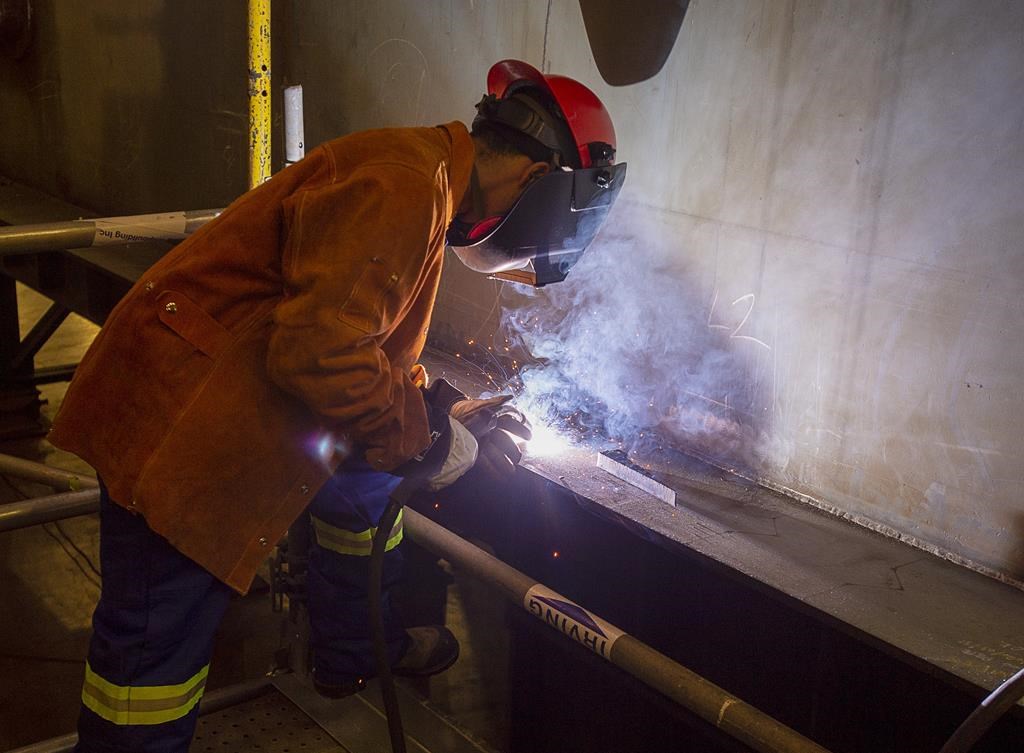Nova Scotia shipbuilding program seeks to draw marginalized groups into industry

HALIFAX — As he bent to seal a small coin into the keel of a new offshore patrol ship, Tyrell Young’s gloved hands kept the welding gun steady while sparks flew.
The ceremony last week, said to bring luck to a ship’s captain and crew, celebrated the official start of construction of HMCS William Hall. The Arctic and offshore patrol ship is named after the famed African Nova Scotian sailor and shipbuilder, who in 1859 became the first Black person to receive the Victoria Cross, awarded for bravery in his service with the Royal Navy.
More than 160 years later, it was another member of the African Nova Scotian community who helped mark the first steps in building the ship named in Hall’s honour. Young is a recent graduate of an all-African Nova Scotian cohort in a program aimed at attracting groups that have been historically under-represented in the industry.
Advertisement
“The course was actually, probably the best thing that happened for me in my life,” Young said in a recent interview. “I got to learn a lot about welding, I established a lot of good friends, peers, people that I respect.”
The Pathways to Shipbuilding program is a collaboration between Nova Scotia Community College, Irving Shipbuilding and government and community partners. It is free for students, with Irving contributing up to $1.5 million a year to cover tuition and other fees.
The first students graduated in 2017, a class of 20 women, and so far there have been four classes of students pass through — another group of women and classes of Indigenous and African Nova Scotian students. Of the 64 graduates to date, 57 have joined Irving Shipbuilding as welders, metal fabricators and iron workers, according to the school.
“At Irving, we view Pathways as one of our vital programs to bring in shipbuilders who can last for decades,” Irving Shipbuilding president Kevin Mooney said in an interview. “They can build careers here, their families can build careers here. This is an extremely valuable part of our long-term strategy to have a skilled workforce.”
Fisheries Minister Bernadette Jordan noted the program addresses a long-standing problem. “Irving recognized something about its industry that many did not: shipbuilding has predominantly been a white man’s game,” she said during the keel-laying ceremony.
Advertisement
Terrah Keener, the dean of the school of access, education and language at Nova Scotia Community College echoed Jordan’s sentiment.
She added that Irving started the program with a goal of expanding and diversifying its workforce, but the program also has a key “cultural component.” For the most recent class of graduates, that meant using Black teachers and bringing in an “Afric-centric” perspective to the classroom.
Shipbuilding in Canada has long followed a cycle of boom and bust as companies scaled up on the backs of lucrative contracts and laid off employees once the work was completed. But some experts say entering the trade now could be a long-term proposition.
Ottawa has tried to correct the boom-bust pattern with the National Shipbuilding Strategy, launched in 2010 under the previous Conservative government to support the construction of Canadian-made vessels rather than outsourcing the work overseas.
“Canada’s building a lot of ships right now … and many of the same skills that go into fabrication and construction go into repair and maintenance and ongoing life support,” Claude Daley, a professor in Memorial University’s ocean and naval architectural engineering program, said in a recent interview.
Advertisement
Jeff Collins, a fellow at the Canadian Global Affairs Institute, agreed that Irving’s roster of contracts leaves it well-placed to offer longevity to its workforce.
Irving was awarded the contract for the Arctic and offshore patrol ships in 2015, and the William Hall will be the fourth of six to be built for the Royal Canadian Navy. Irving has also been tasked with building 15 Canadian surface combatants to replace the navy’s 12 aging destroyers and Halifax-class frigates.
“Halifax Irving would likely be in the most advantageous position in terms of a young, skilled worker coming and starting their career there,” Collins said.
Right now for Young, that work involves becoming a red seal welder, which is the national standard of excellence for welding and can open up opportunities across the country.
Young said being a part of the all-African Nova Scotian cohort of shipbuilders represents an important step toward diversifying the industry.
Advertisement
“The inclusivity is definitely the best part about coming here,” said Young. “In a predominantly white business, it’s definitely hard for a Black student or a Black apprentice or a woman to come into the field, but everybody’s pretty welcoming.”
“We all stand on the same ground,” he added.
This report by The Canadian Press was first published Feb. 21, 2021.
– – –
This story was produced with the financial assistance of the Facebook and Canadian Press News Fellowship.
Advertisement
Danielle Edwards, The Canadian Press